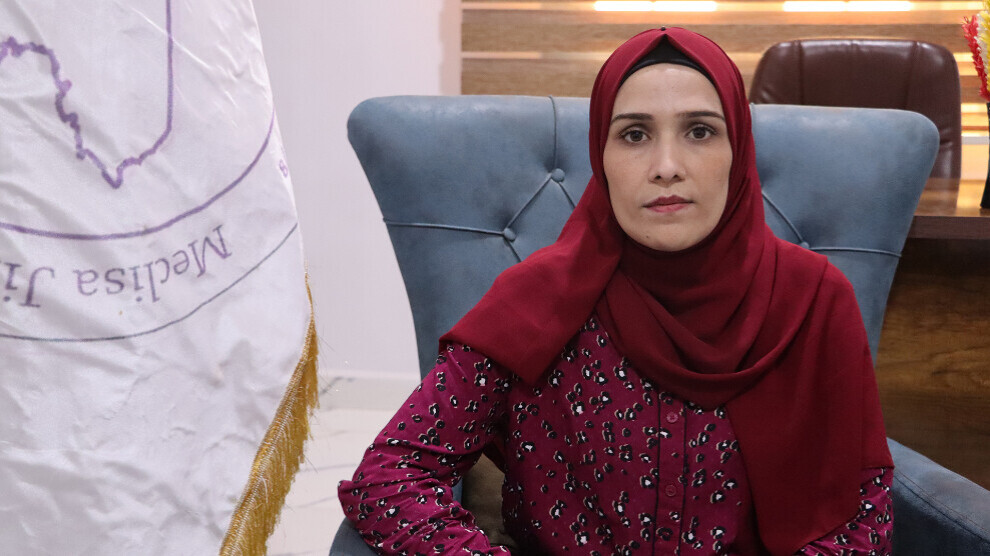‘Jin, Jiyan, Azadî’: Borderless global revolution
Marking the third anniversary of Jina Amini’s death, women worldwide embrace the Jin, Jiyan, Azadî uprising, uniting across borders against violence and tyranny in pursuit of freedom and rights.

Nour al-Ahmad
Raqqa - Syrian Women’s Council member Etimad Ahmed affirmed that the “Jin, Jiyan, Azadî” uprising has garnered global support and solidarity, uniting women’s energy and willpower beyond geographical borders.
September 16 marks the third anniversary of the killing of Kurdish woman Jina Amini by Iran’s so-called “morality police” for a strand of her hair showing. Her death sparked a women’s uprising in Iran against the regime’s oppressive policies toward women, which in turn inspired worldwide solidarity around the slogan Jin, Jiyan, Azadî.
Uprising transcended Iran’s borders
Syrian Women’s Council member Etimad Ahmed said Jina Amini was a victim of Iran’s authoritarian mindset, where authorities impose oppressive laws that strip women of their rights in every aspect of life. She stressed that Amini’s killing reshaped history through women’s powerful stance.
Ahmed noted that Amini became a symbol of resistance against injustice and discriminatory laws: “Jina refused to let her life be dictated by repressive rules. Her defiance lit a path for thousands of women and sparked an uprising that went beyond Iran, spreading across the Middle East and the world in pursuit of equality, freedom, and justice.”
She explained that the Jin, Jiyan, Azadî uprising was not just a protest but a turning point that broke women’s fear and silence, inspiring them to challenge systemic violence and oppression. The slogan, she added, has since become a source of strength and inspiration for women everywhere.
Ahmed emphasized that the women’s uprising in Iran and Rojhilat (Eastern Kurdistan) also generated a deeper awareness: “It opened the way for intellectual and social emancipation, showing that the freedom of society begins with women’s freedom. Women realized they have the right to live with dignity, equality, and to express their views freely.”
She concluded that achieving these aspirations requires joint, organized efforts among women to build a conscious and unified foundation for lasting change.
Uprising united women’s voices
Ahmed praised the stance of women in North and East Syria, noting that they actively supported the uprising through statements, demands for accountability, and protests against Iran’s oppressive laws targeting women. “When women in our region chanted ‘Jin, Jiyan, Azadî,’ they were convinced that the freedom of every woman in the world depends on solidarity,” she said.
She emphasized that the uprising created a genuine language of global women’s solidarity: “Countless women across the world rose up and raised their voices against violence and oppression. This shows how the uprising has united women’s positions, turning it into a symbol of collective struggle.”
Looking ahead, Ahmed expressed hope that Jin, Jiyan, Azadî will become a long-term political project: “Through it, women can shake off the weight of oppression and servitude to take leadership roles in politics, the economy, and society. We are confident that this slogan will lead all women to their freedom and rights.”
She also highlighted the role of the Syrian Women’s Council in uniting efforts: “We are committed to reaching every woman to raise awareness of her rights so she will not be a submissive tool of patriarchal mentality. We aim to protect women from violence and exploitation, preserve their dignity, and empower them to stand against all forms of abuse.”
Ahmed concluded by stressing the importance of keeping the Jin, Jiyan, Azadî uprising alive in collective memory: “It must always be remembered as a model of courage, strength, and resistance to tyranny, violence, and injustice — a slogan to be echoed across the world.”
